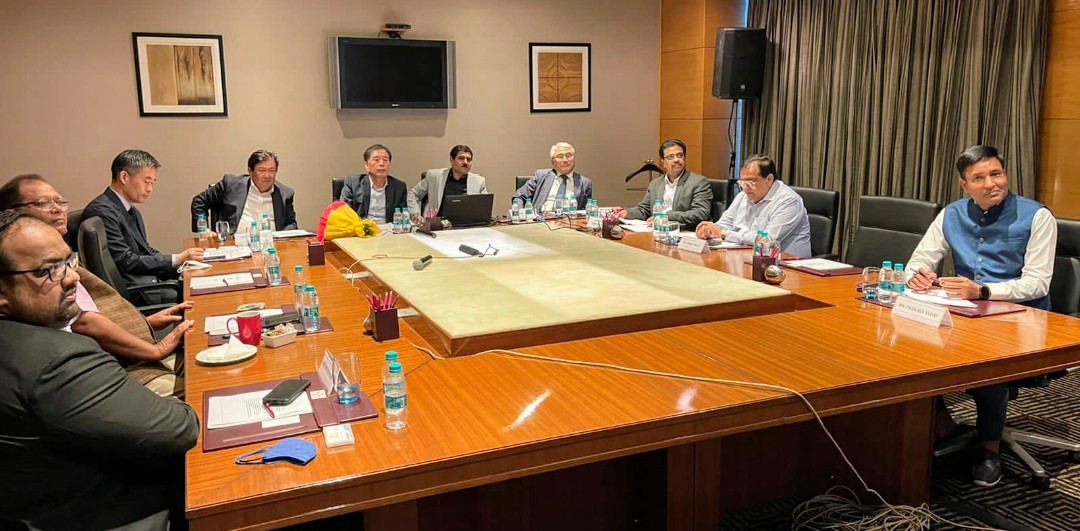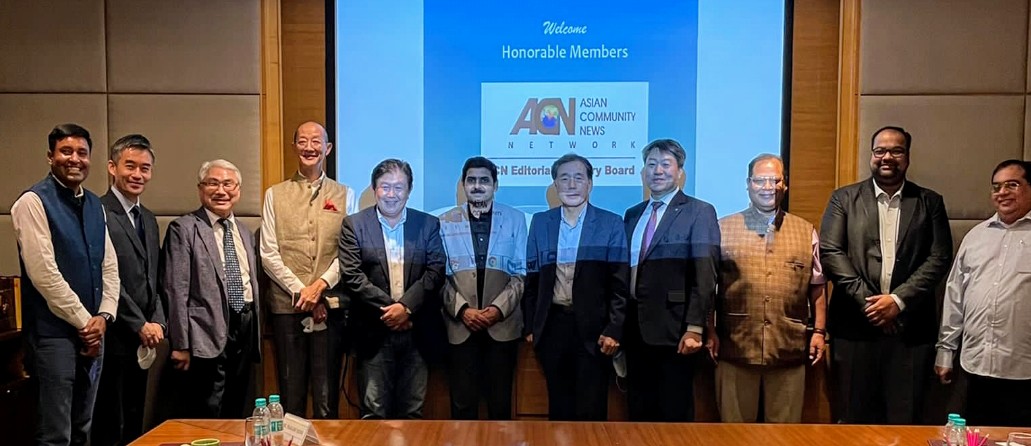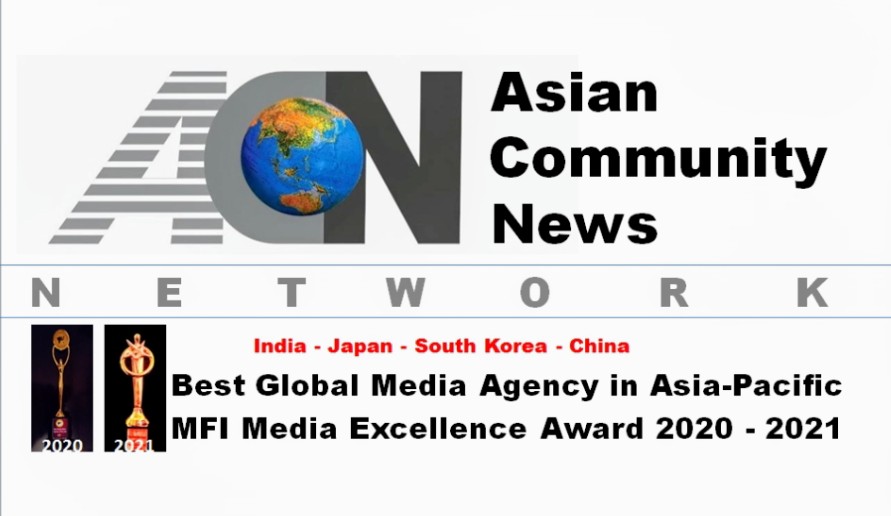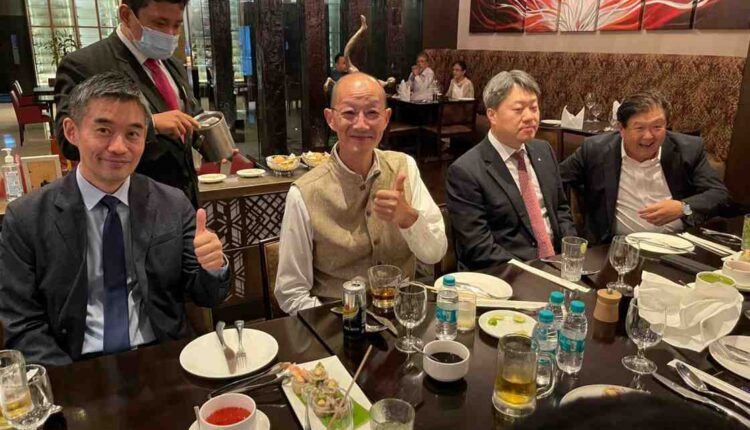Unprecedented: People of Japan, South Korea, India wish to get along socially, work in tandem, and prosper in India
United Colours of Japan, South Korea, and India: The ACN Editorial Advisory Board, an Asian Think Tank has brought the like-minded representatives of three communities together on a common platform.
NEW DELHI: The Asian diaspora – the expatriate community from Japan, and South Korea staying and working in India carry an underlying desire not only to share lighter moments socially but also to engage in commercial understanding and thrive together with Indian counterparts.
Despite historical differences, many expats from Asia’s economic superpowers Japan and South Korea have expressed their earnest desire to mingle during informal gatherings, or play golf and dine & drink together in India, and set an example of cross-culture harmony and co-existence for the global community.

These feelings were expressed by some of the noted Japanese and South Korean nationals during a recent joint meeting of an Asian Think Tank known as ACN Editorial Advisory Board to which they are honorary members. The meeting held in Gurugram (Gurgaon) witnessed unprecedented cross-culture friendly moments when the Japanese welcomed the Korean friends with bouquets of flowers, and Koreans too reciprocated the gesture by welcoming the Japanese with the bouquet of flowers. They along with Indian friends shared laughter, ate and drank together, and discussed many great ideas for getting closer to each other.
It is imperative to mention here that the expats communities from Japan and South Korea have a significant presence in India, and they are highest in number when compared with expats from Europe, the USA, etc. About 13,000 expats from South Korea and 11,000 from Japan work and stay in India, and the number grows in the normal course.

ACN Editorial Advisory Board, which is an offshoot of the Asian Community News (ACN) Network has taken the initiative to bring the communities from Japan, South Korea, and India together on a common platform, which offers a unique opportunity to bring the diverse communities from Japan and South Korea.
Hidehito Jay ARAKI, a Management Consultant for Japanese companies in India, and the ACN Advisory Board member said that Indians, Japanese and Koreans, all shared many things in common despite the fact they looked different. All three are democratic countries, not communists.
“It’s a very good initiative to understand the three countries Japan, Korea, and India. On day to day basis, Japanese and Koreans don’t have many opportunities to interact. Even if we meet on golf courses and play golf themselves but we never and exchange ideas though. We need to make some sort of platform such as ACN Network, and we Japanese and Koreans as well as Indians mingle together and exchange ideas and know each other,” added Mr. Araki.

Mr. Araki said many Japanese would like to interact with Koreans, not just for business but to get closer socially. He said, “Just before discussing anything about business let us know each other on a common platform such as golf and mingle.”
While praising the initiative of the ACN Advisory Board, Euy don Park, President, Federation of Korean Associations in India, said that he was not aware of this kind of trial was ever made globally that expats communities from Japan and South Korea mingling together.
“We have to make this a successful practice. Let’s plan to play football, golf, and dine & drink in the bar-be-que party and enjoy food in Korean and Japanese restaurants. It really feels good that all the board members from Korea, Japan, and India are on the same page and think the same way on how to make the expats community of all three countries prosperous. Let’s promote some common agenda such as organizing some sports activity. Maybe we can have our next meeting at a Korean restaurant,” added Mr. Park who represents Korea in the ACN Advisory Board.
 Mr. Park cited an example of an extraordinary Japanese friendly gesture. In May when scheduled international flights grounded due to the Covid-19 pandemic, the Japanese government had offered a specially chartered plane to help a critically ill Korean child in India to evacuate her from India to Korea.
Mr. Park cited an example of an extraordinary Japanese friendly gesture. In May when scheduled international flights grounded due to the Covid-19 pandemic, the Japanese government had offered a specially chartered plane to help a critically ill Korean child in India to evacuate her from India to Korea.
Besides Indian representatives, the ACN Editorial Advisory Board is represented equally and evenly by Japanese and Korean expats. Japan is represented by Hidehito Jay ARAKI, Management Consultant for Japanese companies in India; Tomio Isogai, Former MD, Sharp India and UAE; and Nobuhiro Takahashi, Former Advisor, Japan Chamber of Commerce & Industry India (JCCII).
Euy Don Park, President, Korean Federation in India and VP, Korean Chamber of Commerce & Industry (KOCHAM); Prof. Do Young Kim, Honorary Director, Korean Studies, Jamia Millia Islamia University, New Delhi; and Sung-chang Hong, Managing Director, NongHyup Bank (NH Bank) represent South Korea, while Suresh Chukkapalli, Honorary Consul General of Korea, Telangana represents South Korea and India alike.

India is represented by J C Pegu (IRS), Former Chief Commissioner, Income Tax, New Delhi; Pawan Choudhary, Advisor, Chief Minister, Haryana, (Foreign Cooperation Department); Rohit Kochhar, Founding Member & Managing Partner, Kochhar & Co.; Prakash Yadav, India Japan Business Promotion Council, ASSOCHAM, and Co-founder, AJU Group of Japanese Hotels; Mohit Malik, Senior Taxation Expert, and Promoter, GST Academy; Arshi Krishnachar, India Head, Seoul Semiconductor & Chairman, ISLE, Karnataka; and Shiv Kothari, Founder, Chain of Tokyo Stores.
Sanjeev K Ahuja, Founder, and Editor-in-Chief of Asian Community News (ACN) Network said that Japanese and Korean expats working in India owned an earnest desire to interact with each other and share lighter moments and mingle with each other socially before they could discuss business but what all they needed was an opportunity or a common platform like ACN Advisory Board to get close and do away with the hesitation to do so.
While appreciating the ACN Network for making this great opportunity available to two nations Japan and Korea to get together on a common platform, the Indo-Japanese relations expert and former Managing Director of Sharp India, Tomio Isogai, said, “When I was with Sharp India, I dealt with Korean vendors who supplied components to Sharp India. At that time, I had the opportunity to interact with them and make many Korean friends. We, basically Japanese and Koreans, are brothers and sisters although the country-wise and politically there is something that was happening but people to people we are very close. When we get together on various occasions, we can understand each other more”.

Mr. Isogai said, “India is going to be a great country and power in coming decades and Japanese and Koreans want to contribute through that development of India. So that we can make a great group of people here. It is the trilateral relationship that we can boast of as it never happens in other parts of the world.”
Related article: 日本-韓国-インド 友好ゴルフコンペ企画中。Japanese, South Koreans and Indians to play golf together in triangular golfing event 삼국골프 이벤트에서 함께 골프를 즐기는 일본인,한국인,인디언
Prof. Do Young Kim first came to India from Korea in 1988 and has been here for the last 34 years. His stay in India is a little longer than the time he spent in Korea.
“When I look into the last 30-33 years of developments, I found that India, Korea, and Japan together have organized some joint meetings on the academic fronts. But this kind of platform (ACN Advisory Board), I have seen for the first time. I see huge possibility and potential of expanding the membership of this think tank further. We require stable and faithful devotion but I am sure it’ll come up. Many more Koreans, Indians, and Japanese can be included in this platform. That’s why this platform is really good. This will be developing like a practical think tank, as we can include all kinds of people. Character-wise, the Korean community in India is quite unlike other countries and it is of very high standards. They are business people and they are generally heads of big institutions. I guess it’s the same with Japanese people also. It’s a wonderful platform for bringing this kind of harmony, and it will prove to be a great contribution to society,” Prof. Kim added.
 Suresh Chukkapalli, Honorary Consul General of the Republic of Korea, Telangana praised ACN for bringing the three democratic countries together and offered to support this initiative. He said that while Japanese and Koreans were brothers and sisters, India too enjoyed centuries-old bondage with South Korea.
Suresh Chukkapalli, Honorary Consul General of the Republic of Korea, Telangana praised ACN for bringing the three democratic countries together and offered to support this initiative. He said that while Japanese and Koreans were brothers and sisters, India too enjoyed centuries-old bondage with South Korea.
“Some of the Koreans are our children as Queen Huh Hwang-ok who was primarily Princess Suriratna of Ayodhya (UP, India) is our blood and many of the clans on Korea are her blood. She had married to Korean King Kim Su-ro. We are more than blood brothers to Koreans. And Japanese and Koreans are brothers so we all. Thus Japanese, Koreans, and Indians are related to each other. It’s Vasudhaiva Kutumbakam, वसुधैव कुटुम्बकं – the world is one family,“ said Mr. Chukkapalli by adding, “We should do more art and cultural events, and also bring Japanese and Korean language books to India and get them translated into English and publish here.”
The ACN Board members were of the view that the base of this Asian Think Tank should be broadened and its reach widened by making more and more people from Japanese, Korean, and Indian communities members of this common platform.
Euy Don Park said that the emphasis should be laid to expand the reach of the think tank in the Japanese and Korean community, and it would not be possible without the help of the institutions like chambers of commerce of Japan and Korea, such as JCCII and KOCHAM.
“We can take the help of the community associations such as Korean, and Japanese but major thrust would come from the Chambers of both the countries. We need to extend the membership and make it a big group. It’s a challenging task but a great start to making ACN Board bigger,” he added.
Hidehito Jay ARAKI also said most of the time, Japanese and Korean might be feeling shy but they needed to be given an opportunity to interact with each other.
While supporting the very idea of organizing trilateral golf events involving Japanese, Korean and Indian people, Mr. Araki said, “Many Indo-japan and Indo-Korea tournaments are being organized but I have not ever heard of Indo-japan-Korea, the three nations playing together. Such occasions make sure that participants communicate with English as a common language even if some of us don’t speak good English as the Indians do.”
Mr. Araki suggested that the institutions such as JETRO, JICA, JNTO, and JCCII as well as those on the Korean side should also be invited to such events for their support.



